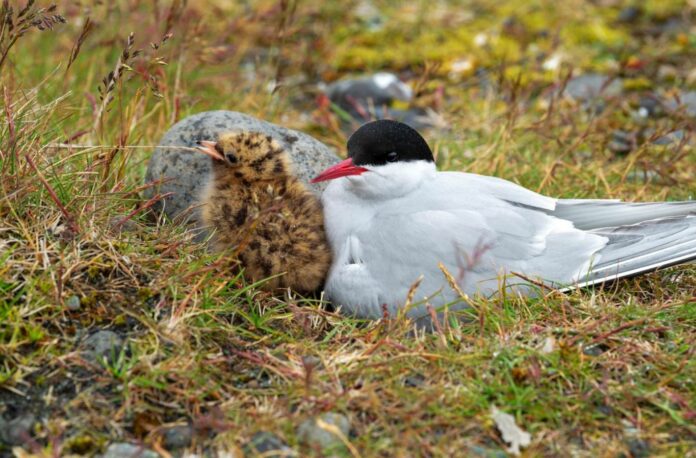How does climate change affect Arctic Terns?
Arctic terns, renowned for their record-setting migration distances on our planet, might be capable of withstanding the perils brought about by climate change, according to fresh research findings.
These birds experience nearly endless daylight, reproducing in Earth’s northern territories before making their journey to Antarctica during the Southern Hemisphere’s summer. Remarkably, they traverse a distance throughout their lifetime equivalent to three moon trips.
The recent investigation, spearheaded by the University of Exeter and the Met Office, delved into the potential effects of climate change on Arctic terns, primarily during non-breeding periods. The team scrutinized modifications to wind patterns, primary productivity impacting food sources at crucial Arctic tern locations, and shifts in Antarctic sea ice.
Despite projections suggesting increased challenges in foraging within the North Atlantic, the research implies that the overall climate change impacts on migrating terns might be insignificant. Their expansive habitats likely contribute to their resilience.
However, the investigators caution that the cumulative effects of several minor changes may still negatively impact this durable (up to 30 years lifespan) species, while other species might be trapped by local and regional shifts.
“Arctic terns rely on productive oceans for food, sea ice for rest and foraging, and prevailing winds during flight,” adds Dr. Joanne Morten from the University of Exeter.
Although globally, the Arctic tern is categorized as a ‘least concern’ species on the IUCN Red List, their breeding populations are dwindling, posing a challenge for monitoring efforts.
“Climate change is a massive threat to all seabirds. Our study looked at specific aspects of this.
“So, while our findings suggest this species may be resilient, this is only part of a bigger picture for Arctic terns and many other species.
“Meeting carbon emissions targets is vital to slow these projected end-of-century climatic changes and minimise extinction risk for all species.”
The researchers utilized ongoing climate change observations and multiple climates and Earth System Models to project changes until 2100.
They assessed the implications of two emissions pathways: a ‘moderate’ scenario and a ‘fossil-fuel intensive’ development.
The latter scenario projected a downturn in primary productivity, a fundamental level of all food chains, in the North Atlantic – a crucial feeding zone for countless seabirds and other marine creatures.
Conversely, minor changes in primary productivity were projected at three other major locations for Arctic terns: the Benguela Upwelling, the Subantarctic Indian Ocean, and the Southern Ocean.
The repercussions of an expected decline in Antarctic sea ice on terns remain unclear, and the forecasts suggested minor alterations to prevailing winds would have “minimal impacts” on tern migration, barring in the Southern Ocean, where intensifying winds may compel the birds to modify their flight paths.
This comprehensive study adopted an interdisciplinary strategy, commencing with a virtual Climate Data Challenge ‘hackathon’ orchestrated by the University of Bristol and the Met Office.
The collective research team included academics from the universities of Liverpool, Bristol, Washington, Oxford, and Iceland.
Source: 10.1111/gcb.16891
Image Credit: Shutterstock
